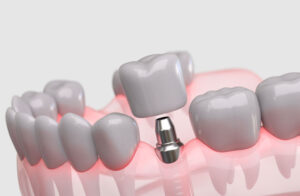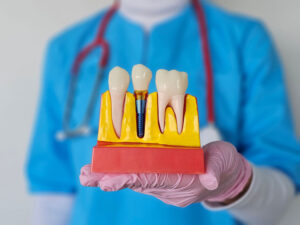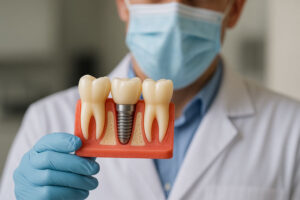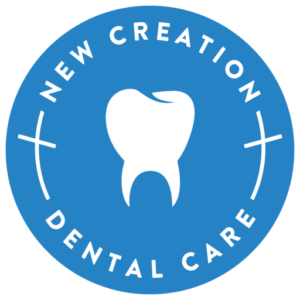Welcome to the ultimate guide to dental crowns, your comprehensive resource for all things related to this essential dental procedure. Whether you’re considering getting a dental crown or are simply curious about the process, this guide has got you covered. From understanding the different types of crowns to the benefits and aftercare, we’ve curated all the information you need to make informed decisions about your oral health.
At New Creation Dental Care, we aim to make it simple for you to make an informed decision regarding dental crowns. In this guide, we’ll address common concerns, debunk myths, and provide expert tips to ensure you feel confident in every detail.
So, whether you’re looking to enhance your smile or preserve the function of a damaged tooth, join us as we navigate the ins and outs of dental crowns.
Understanding Dental Crowns
Dental crowns, or “caps,” are customized prosthetics placed over damaged or decayed teeth to restore their shape, size, and strength and improve their appearance. These crowns are cemented into place and fully encase the visible portion of the tooth above the gum line. They are designed to mimic the tooth’s natural structure and can be made from various materials such as porcelain, ceramic, metal, or a combination of these materials.
The primary function of a dental crown is to provide protection and support to a weakened tooth. This could be due to extensive decay, a large filling, a root canal treatment, or a cracked tooth. By encasing the damaged tooth, a dental crown acts as a protective shield, preventing further damage and preserving the tooth’s functionality.
When considering dental crowns, it’s essential to consult with a qualified dentist who can evaluate your dental health and recommend the most suitable treatment plan. Understanding the purpose and benefits of dental crowns is the first step toward making informed decisions about your oral health.
Types of Dental Crowns
There are several types of dental crowns, each with unique characteristics and advantages. The most common types include porcelain-fused-to-metal (PFM) crowns, ceramic crowns, metal crowns, and zirconia crowns. Porcelain-fused-to-metal crowns are known for their durability and natural appearance, making them a popular choice for front and back teeth. On the other hand, ceramic crowns are prized for their aesthetic appeal, as they can be precisely matched to the color of existing teeth.
Metal crowns, often made of gold or other alloys, are renowned for their strength and longevity. While they may not blend in with the natural teeth, metal crowns are preferred for their ability to withstand biting and chewing forces. Zirconia crowns, a relatively newer option, offer a blend of strength and aesthetics, making them a versatile choice for dental restorations.
Choosing the right type of crown depends on various factors, including the location of the tooth, the patient’s oral health, aesthetic preferences, and budget. At New Creation Dental Care, Dr. Boscia provides recommendations based on your needs and guides you through the selection process to ensure the best possible outcome.
Reasons for Getting Dental Crowns
There are several reasons why a dentist may recommend a dental crown as part of a treatment plan. One common scenario is when a tooth has undergone extensive decay and requires more support than a filling. In such cases, a dental crown can effectively restore the tooth’s strength and functionality, preventing extraction.
Dental crowns are often used to protect and support teeth that have undergone root canal therapy. After removing infected or damaged tissue within the tooth, a crown is placed to seal the treated tooth, providing a protective barrier against further infection and damage. Crowns also play a crucial role in preserving and strengthening teeth fractured or weakened due to trauma or injury.
Dental crowns can also be utilized for cosmetic purposes, improving the appearance of misshapen, discolored, or poorly aligned teeth. By placing a crown over these teeth, a dentist can enhance the overall symmetry and aesthetics of the patient’s smile, boosting their confidence and self-esteem.
Understanding the specific reasons for getting dental crowns is essential in appreciating the multifaceted benefits they offer, from restoring oral health to enhancing the visual appeal of a smile.
Dental Crown Procedure
The process of getting a dental crown typically involves multiple steps, beginning with an initial consultation with your dentist. At New Creation Dental Care, Dr. Boscia will conduct a comprehensive examination of the affected tooth, which may include X-rays to assess the extent of damage or decay. Based on the evaluation, he will discuss the recommended treatment plan, including the type of crown best suited for your needs.
If a dental crown is deemed necessary, the dentist will begin by preparing the tooth to accommodate the crown. This involves reshaping the tooth to create space for the crown to fit securely. In some cases, additional dental work, such as filling or root canal therapy, may be required to ensure the tooth is stable and healthy before the crown is placed.
Once the tooth is prepared, the dentist will take impressions of the tooth to create a custom-made crown that matches the shape and size of the natural tooth. These impressions are sent to a dental laboratory where the crown is fabricated to precise specifications. While the permanent crown is being made, a temporary crown may be placed over the prepared tooth to protect it until the final restoration is ready.
When the custom crown is ready, the dentist will carefully place it over the prepared tooth, ensuring a proper fit and alignment. The crown is then cemented into place, creating a strong bond with the underlying tooth structure. The dentist will make any necessary adjustments to ensure the bite and appearance are comfortable and natural.
The dental crown procedure is a collaborative effort between the patient and the dental team, with a focus on achieving optimal oral health and aesthetics. Understanding the step-by-step process can alleviate any apprehensions and prepare individuals for a smooth and successful treatment experience.
Aftercare and Maintenance of Dental Crowns
Following the placement of a dental crown, proper aftercare and maintenance are crucial to ensuring the longevity and effectiveness of the restoration. It’s essential to maintain good oral hygiene practices, including regular brushing and flossing, to prevent plaque buildup and protect the surrounding teeth and gums.
Additionally, individuals with dental crowns should schedule routine dental check-ups to allow the dentist to monitor the condition of the crown and the underlying tooth. These regular examinations provide an opportunity for early detection of any issues, such as wear and tear or potential complications, allowing for timely intervention to preserve the integrity of the crown and the overall oral health.
Avoiding habits that can compromise the integrity of the dental crown is also important. This includes refraining from biting on hard objects, such as ice or pens, and avoiding excessive force when chewing, especially on the side where the crown is placed. By being mindful of these habits, individuals can minimize the risk of damage to the crown and maintain its functionality for an extended period.
In cases where a dental crown becomes loose, damaged, or causes discomfort, it’s essential to seek prompt dental attention for evaluation and necessary repairs. Timely intervention can prevent further complications and ensure that the dental crown continues to fulfill its role in preserving the health and function of the tooth.
By embracing proper aftercare practices and staying vigilant about maintenance, individuals can maximize the lifespan of their dental crowns and enjoy the benefits of a healthy, functional smile.
Advantages of Dental Crowns
Dental crowns offer a multitude of advantages that contribute to their widespread use in dental restoration and enhancement. One of the primary benefits is their ability to strengthen and protect weakened or damaged teeth, preventing the need for extraction and more invasive treatments. By preserving the natural tooth structure, crowns help maintain the integrity of the dental arch and the overall oral health of the patient.
Dental crowns are also instrumental in restoring the functionality of a tooth that has undergone extensive decay, trauma, or other structural issues. Whether it’s supporting a large filling, covering a cracked tooth, or providing stability after root canal therapy, crowns play a pivotal role in enabling patients to bite, chew, and speak with confidence and comfort.
Aesthetically, dental crowns can significantly enhance the appearance of a smile by concealing imperfections such as discoloration, misalignment, or irregular shape. With advancements in dental materials and techniques, crowns can be custom-designed to blend seamlessly with the natural teeth, creating a harmonious and natural-looking smile.
The versatility of dental crowns allows for comprehensive treatment solutions, addressing a wide range of dental concerns with tailored restorations. Whether it’s a single tooth restoration or a full-mouth reconstruction, crowns can be adapted to meet the unique needs and goals of each patient, providing personalized and durable outcomes.
The advantages of dental crowns extend beyond the physical and aesthetic aspects, encompassing the emotional and psychological well-being of individuals. By restoring oral health and confidence in one’s smile, crowns have the potential to positively impact an individual’s overall quality of life, fostering self-assurance and a sense of well-being.
Understanding the myriad benefits of dental crowns underscores their significance in modern dentistry, offering comprehensive solutions for both functional and aesthetic dental concerns.
Potential Risks and Complications
While dental crowns are generally considered safe and effective, there are potential risks and complications that individuals should be aware of when undergoing this dental procedure. One common concern is the possibility of allergic reactions to certain materials used in the fabrication of crowns, especially metal-based crowns. Patients with known metal allergies should communicate this information to their dentist to explore alternative materials that are compatible with their sensitivities.
Another potential risk is the development of dental crown-related issues, such as decay or gum disease around the margins of the crown. This can occur if the crown is not properly fitted or if there are gaps between the crown and the natural tooth, allowing bacteria to infiltrate and cause damage. Regular dental check-ups are essential for early detection of such issues and prompt intervention to prevent further complications.
Additionally, there is a risk of the crown becoming loose or dislodged, particularly if it is subjected to excessive force or trauma. This can compromise the integrity of the restoration and may necessitate immediate dental attention to address the issue and secure the crown back in place.
Individuals with dental crowns should be mindful of potential changes in bite alignment or discomfort while chewing, as these could indicate issues with the fit or functionality of the crown. Any persistent discomfort or irregularities should be promptly reported to the dentist for evaluation and necessary adjustments.
By understanding the potential risks and complications associated with dental crowns, individuals can actively participate in their oral health care and collaborate with their dental providers to mitigate these concerns and ensure the long-term success of their dental restorations.
Cost of Dental Crowns
The cost of dental crowns can vary based on several factors, including the type of crown chosen, the complexity of the procedure, and the geographic location of the dental practice. Generally, porcelain-fused-to-metal crowns tend to be more affordable compared to all-ceramic or zirconia crowns, primarily due to differences in material and fabrication costs.
The extent of dental work required, such as additional treatments like root canal therapy or periodontal procedures, can impact the overall cost of getting a dental crown. These supplementary treatments are often necessary to ensure the optimal health and stability of the tooth before the crown is placed, contributing to the total investment in the restoration process.
Geographic location also plays a role in determining the cost of dental crowns, as dental fees can vary regionally based on factors such as local economic conditions, overhead costs, and the standard of living. In Lake St. Louis, MO, schedule a consultation with Dr. Boscia at New Creation Dental Care to obtain a comprehensive breakdown of the costs associated with dental crowns and explore potential financing options or insurance coverage that may help offset the expenses.
While the upfront cost of dental crowns is an important consideration, it’s essential to recognize the long-term value they offer in terms of oral health, functionality, and aesthetics. Investing in quality dental restorations can contribute to the overall well-being and confidence of individuals, making the cost of crowns a worthwhile investment in their dental future.
Choosing the Right Dentist in St. Louis for Dental Crowns
Selecting the right dentist for dental crown treatment is a critical decision that can significantly impact the success and satisfaction of the restoration process. When seeking a dentist for dental crowns, individuals should consider factors such as the dentist’s experience and expertise in restorative dentistry, as well as their approach to patient care and communication.
It’s important to choose a dentist who takes the time to understand each patient’s individual needs and goals, offering personalized treatment plans and comprehensive guidance throughout the entire process. A dentist who prioritizes patient education and transparency can empower individuals to make well-informed decisions about their oral health and treatment options.
Additionally, seeking recommendations from trusted sources, such as family, friends, or online reviews, can provide valuable insights into the quality of care and the patient experience offered by a particular dental practice. Visiting the dental office for an initial consultation can also provide an opportunity to assess the environment, meet the dental team, and gauge the level of professionalism and attentiveness provided.
Individuals should inquire about the technologies and materials used by the dental practice, as advancements in dental technology and high-quality materials can contribute to the precision and longevity of dental restorations.
By carefully selecting a dentist who aligns with their values and expectations, individuals can confidently embark on their dental crown journey, knowing that they are in capable and caring hands.
Start Your Dental Crown Journey With New Creation
The journey to understanding dental crowns is a comprehensive exploration of the benefits, considerations, and nuances of this essential dental procedure. We hope this guide offered insight and knowledge to help you make an informed decision about your oral health.
If you’re in the Lake St. Louis, Wentzville, or O’Fallon region, contact New Creation Dental Care for a consultation on your best next steps in the dental crown process.





